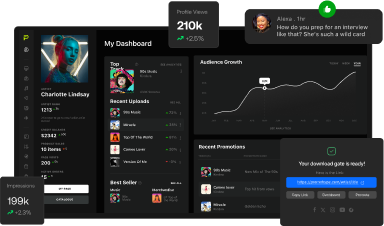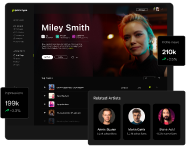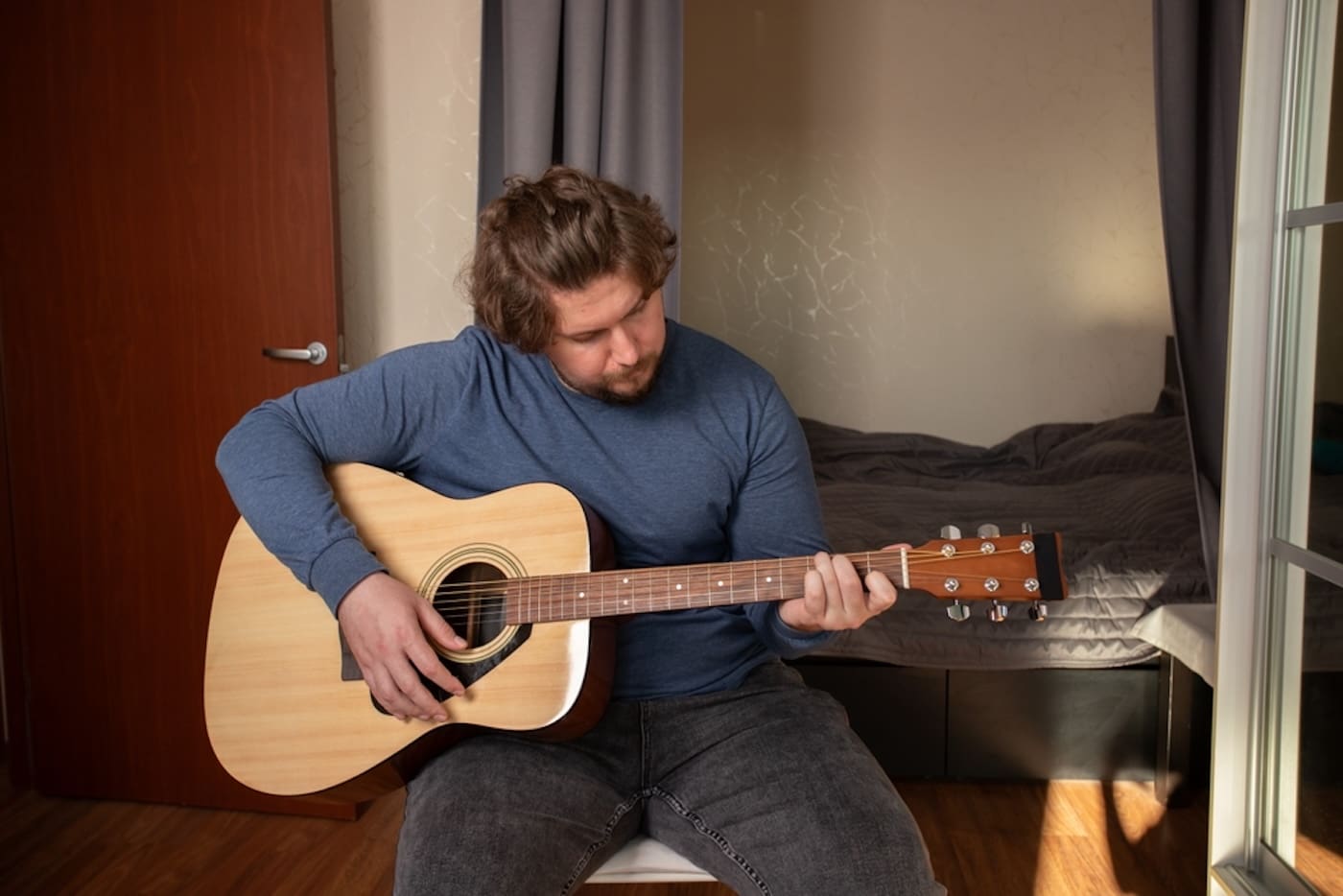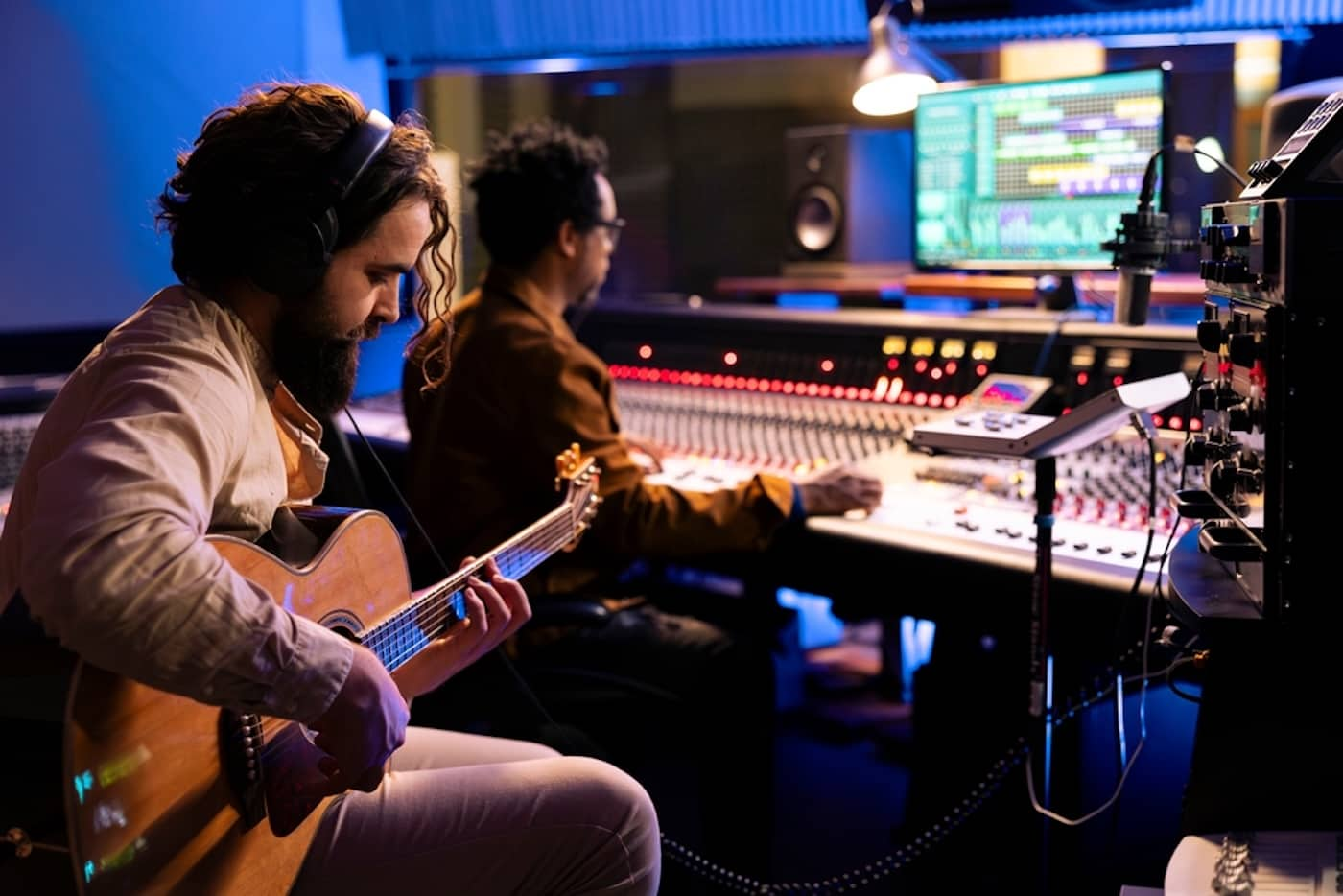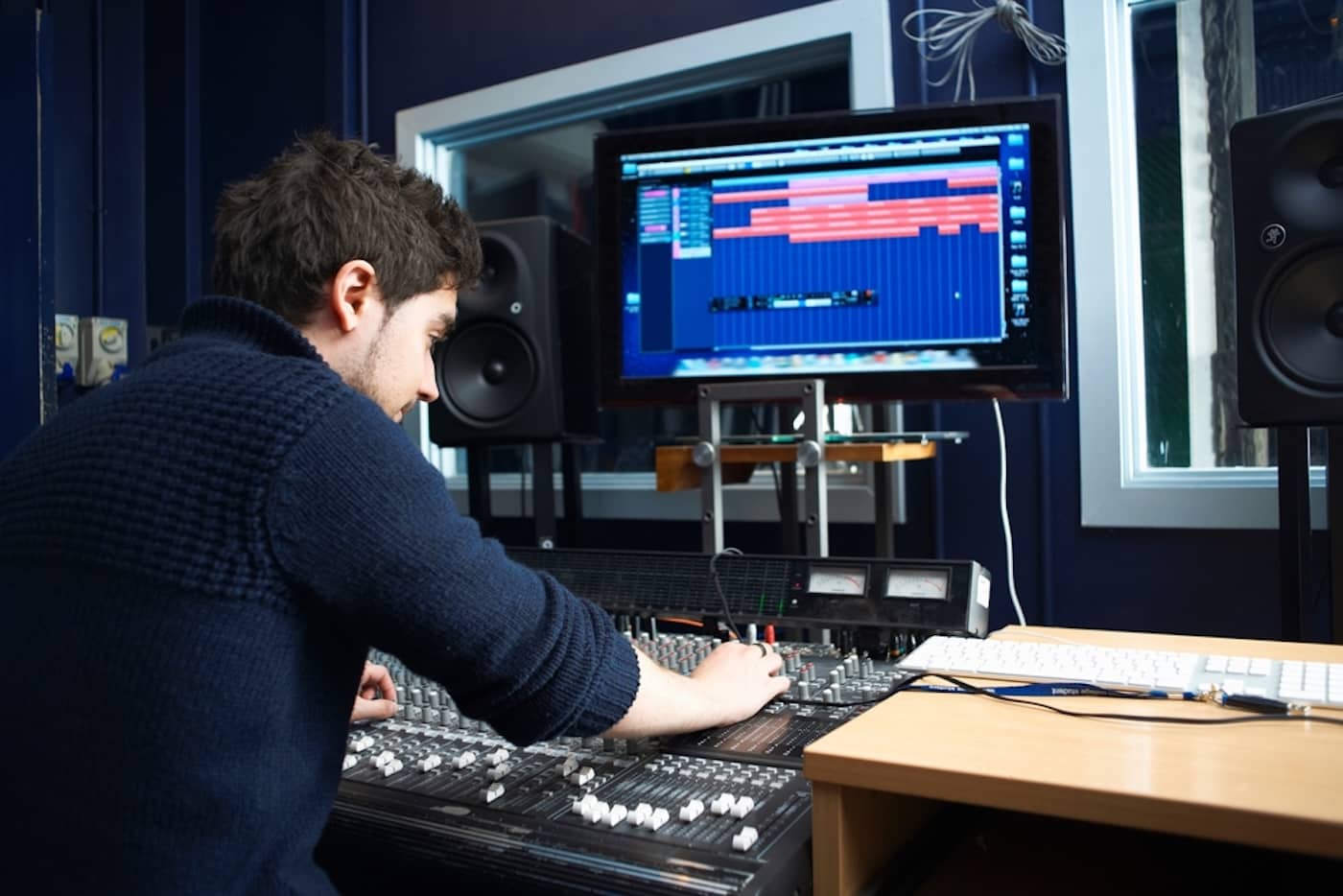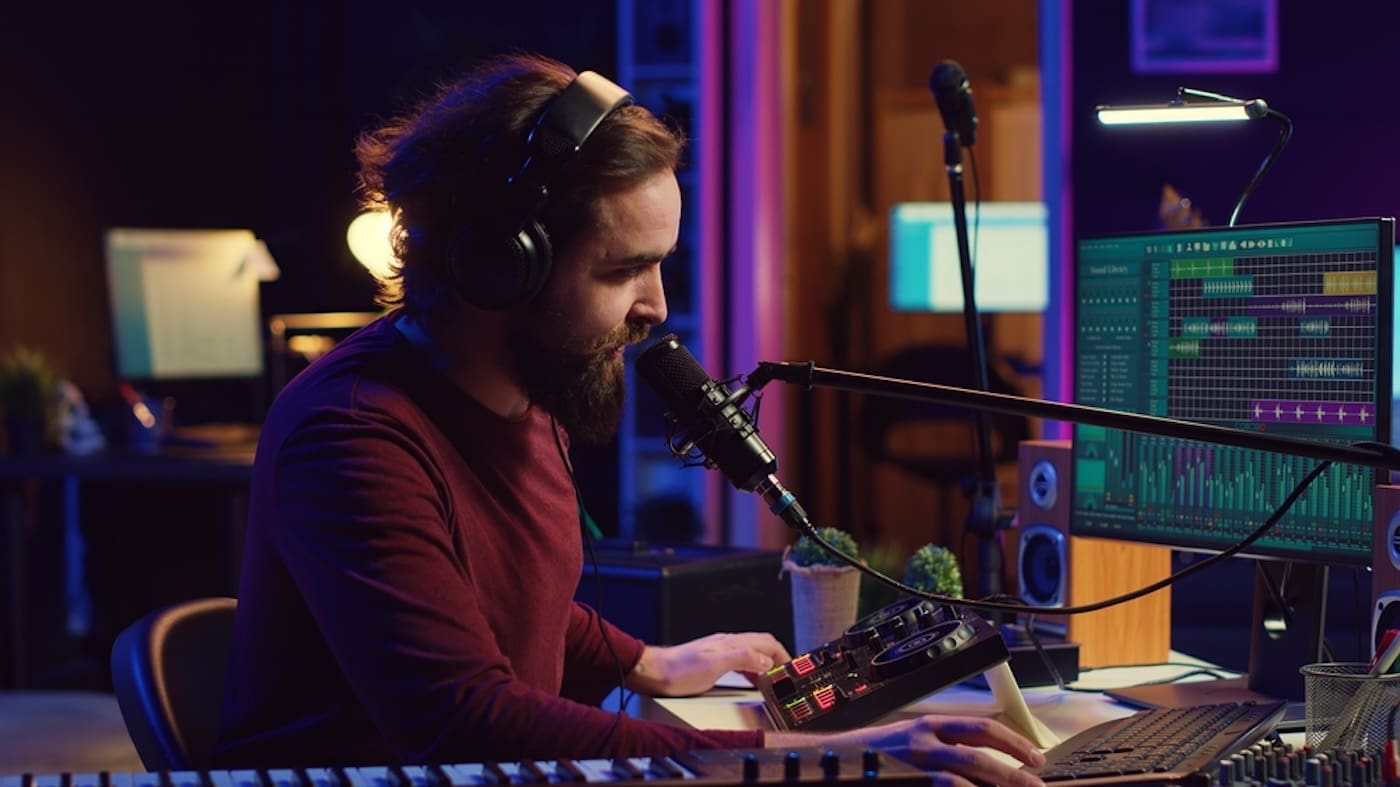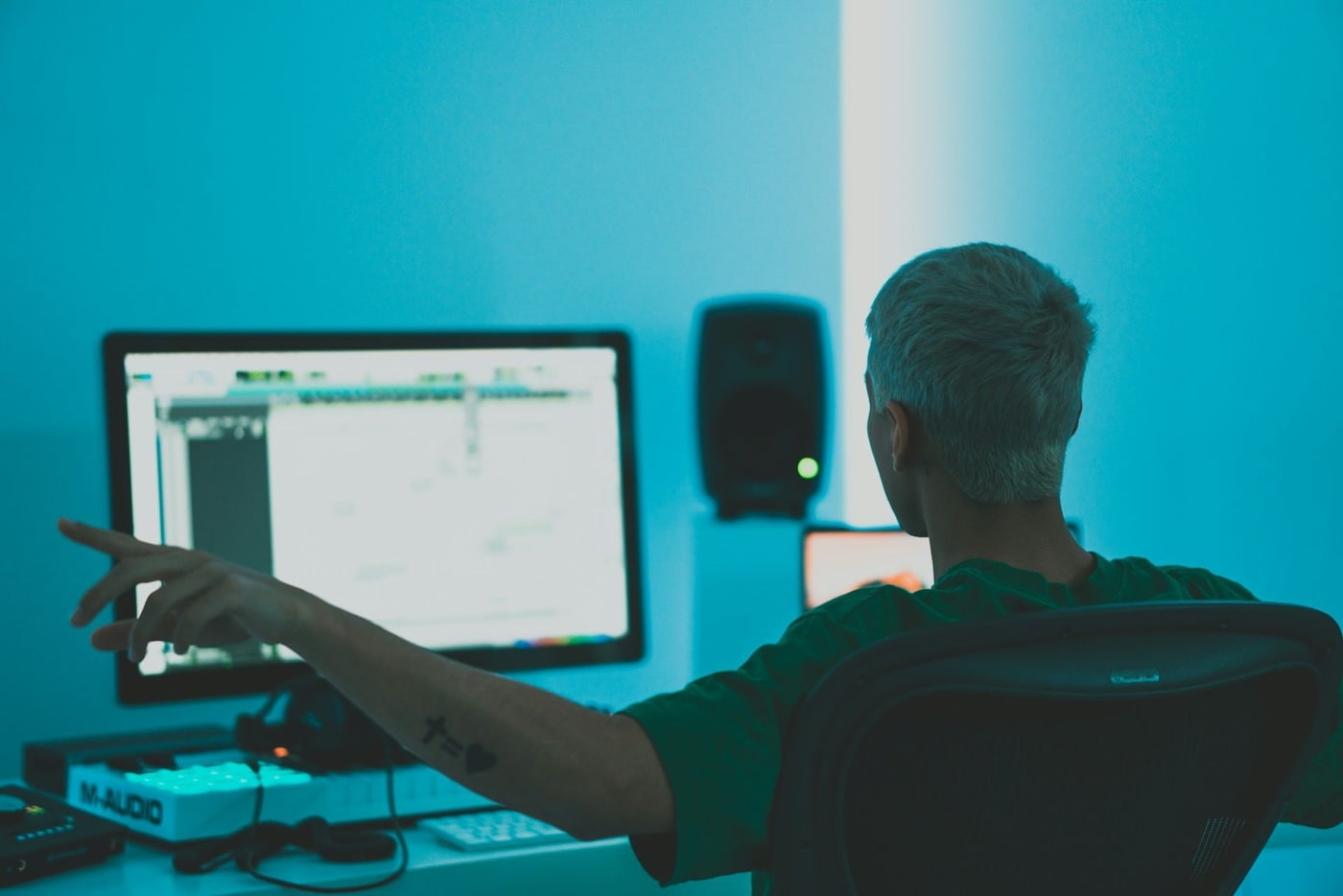
Producing music professionally is a dream job for many, but it requires an understanding of various processes and tools.
Learning how to become a music producer means breaking down the production techniques and creating a streamlined workflow.
This guide covers everything you need to know to become a music producer, from core skills to essential equipment.
So, without further ado, let’s dive into how to get started producing music and all that’s required.
Get Early Access
To Promo Hype
What Is A Music Producer?
A music producer oversees all the processes needed for creating music, taking an overarching view of what each project entails.
Producers work closely with singer-songwriters and bands on individual tracks and albums to define the sound and style.
This ensures the music showcases a distinct creative vision, from the song structures to the instrumentation and production values.
As such, the music producer has a strong understanding of technical aspects, project management, and guiding the artists’ performances.
What Does A Music Producer Do?
A music producer tackles a variety of roles throughout the process to ensure projects are completed to the highest possible standards.
Here’s a brief overview of what a music producer does and how their role is crucial for production:
- Scheduling recording sessions: If you’re producing music for a singer-songwriter or band, part of the role involves scheduling recording sessions and ensuring everything is ready to use.
- Arranging songs and instrumentation: While not all producers write songs, they are heavily involved in the arrangement and instrumentation aspects of production.
- Coaching the talent: If you’re working with new artists, your role will involve coaching singers and musicians to help them develop their music and establish a unique style.
- Legal and administrative tasks: A professional record producer also handles legal tasks related to copyright and other duties, including negotiations with record labels and royalty payments.
Additional roles can also include hiring session musicians, managing production budgets, and liaising with music industry professionals.
Essential Music Production Resources
Whether you’re new to the process or developing a music production career, there are excellent resources to help you succeed.
Here’s an overview of the resources you can use to start producing music like a professional:
- YouTube tutorials: If you’re new to the learning process, there are many YouTube tutorials to help you grasp the basics and begin the creative process.
- Online forums and communities: Online forums are excellent for overcoming obstacles and receiving direct advice without incurring any costs.
- Music production courses: The best online music production courses can streamline the learning process and streamline your creative journey.
- Attending a music production school: If you have the time and money, attending one of the best music production schools will make it easier to break into the music business.
You can also learn by partnering with other producers and musicians to gain a deep understanding of their workflows and styles.
Music Production Equipment List
Before you can become a music producer, you’ll need to invest in the best music production equipment for recording, editing, and mixing music.
Here’s an overview of the core hardware, software, and accessories required to become a successful music producer:
- Computer/laptop: The best PCs for music production have powerful processors and plenty of RAM to ensure projects run smoothly.
- Music production software: Music production requires digital audio workstations, with free options like Audacity or professional DAWs, such as Pro Tools and Cubase.
- Audio interface: The audio interface is vital for connecting and recording vocals and instruments, with affordable options available for a basic studio setup.
- MIDI keyboard/controller: Using a MIDI keyboard streamlines compositions and removes the necessity for using the DAW piano roll.
- Microphones: If you’re recording vocals or traditional instruments, you can pick up condenser microphones at a range of prices.
- Headphones/monitor speakers: A good pair of headphones or monitor speakers is essential for mixing, mastering, and checking the audio quality of your productions.
You can also check out specific gear based on your chosen genre, such as the influential software used in techno or other styles.
How To Become A Music Producer In 2025 (Step-By-Step)
Whether producing music for local bands or exploring electronic genres, the process of becoming a producer is essentially the same.
Let’s begin this step-by-step guide and break down how to become a music producer and launch a successful career:
Step 1. Set Up A Home Studio
Before you can start making music, you’ll need to build a home recording studio to transform a musical idea into a finished track.
Start by preparing your studio space and selecting a room that is free from background noise and other potential distractions.
Take the time to think through your workflow and set up your studio monitors correctly to ensure they deliver accurate results.
You can also incorporate acoustic treatment or soundproofing to control the environment and enhance the quality of recordings.
Once everything is set up, you can begin integrating any desired hardware and music production software for your projects.
Step 2. Learn Digital Audio Workstations
Digital audio workstations are essential for editing, mixing, and mastering your recordings, making them ready for publication.
The best DAWs offer comprehensive features for the entire process, with intuitive user interfaces that are easy to learn.
If you’re producing music for bands, free DAWs like GarageBand and Audacity are great entry-level options, while Pro Tools is used in the industry.
Alternatively, FL Studio and Ableton Live are primarily geared toward electronic musical genres, such as house, techno, and drum and bass.
You can also capitalize on the best free VST plugins to add more virtual instruments and effects plugins to the basic DAW software options.
Step 3. Understand Music Theory
Understanding music theory is vital for working on music projects and collaborating with singers, musicians, and fellow producers.
If you’re working with musicians, learning how to read sheet music will significantly streamline your workflow and collaborative efforts.
Core concepts to learn include notes and their relationships to scales and chords, as well as time signatures and the overall structure of a song.
These fundamentals can be expanded to cover chord progressions and harmonies, with online courses to help master the concepts.
Step 4. Master The Recording Process
Arranging and running a recording session involves setting up microphones and other equipment correctly before the artists arrive.
It also requires strong interpersonal skills to coordinate with the talent and ensure the session runs without any issues.
You can achieve this by fine-tuning your recording process, thoroughly testing equipment, and liaising with artists in advance.
Once you’re confident with the workflow, you can experiment with more unique recording processes to create music with a distinct sound.
Get Early Access
To Promo Hype
Step 5. Experiment With Audio Editing
DAWs include robust audio editing tools to help producers craft unique sound designs with polished and professional results.
Once you’ve gathered your recordings, you can experiment with these tools to bring depth, space, and character to your music.
Basic audio editing, such as noise reduction and volume balancing, can be further enhanced with the addition of reverb, chorus, and other effects.
These can be applied to samples, recordings, and MIDI sequences, depending on the assets used in your musical project.
Step 6. Learn Mixing & Mastering
While professional studios often employ a dedicated mastering engineer, learning how to mix and master is essential for most producers.
The mixing process is performed throughout the production pipeline, ensuring all elements are balanced and optimized in the mix.
Mastering typically occurs at the project’s conclusion, using multi-channel EQs, audio compression tools, and limiters.
If you’re unclear on the processes required, consider attending workshops to acquire a solid understanding of mixing and mastering.
Step 7. Write Music For Continuous Learning
Becoming a successful music producer won’t happen overnight, but engaging in the process will streamline continuous learning and development.
This means striving for a prolific output, creating a few demos, and assessing how you can refine your workflow for better results.
It also extends to composition and arrangement, exploring different types of chords, harmonies, and how to use instrumentals.
This approach to learning will improve all aspects of production, from mastering your DAW to mimicking the style of your favorite songs.
Step 8. Build Your Collaboration Skills
Another effective method for improving your production abilities is collaboration, working with other artists and producers on new projects.
The most successful independent artists frequently collaborate on songs to explore different genres and gain experience.
Working with other musicians and building positive relationships will also increase your ability to gain exposure in professional circles.
It’s an excellent way to develop the necessary people skills producers must have, building your skills from constructive criticism.
Step 9. Follow Industry Trends
The music industry is constantly evolving, with new tools and methodologies used by great producers you can learn from.
This makes following the latest industry trends a vital aspect of production, from the role of AI to the emergence of new subgenres.
Other industry trends include the growing role of spatial audio and the adoption of blockchain for music rights management.
By staying abreast of the latest developments, you can refine your production pipeline and create music with minimal friction.
Step 10. Distribute Your Music
Once you’re happy with the quality of your productions, your music is ready for distribution on streaming platforms and physical media.
You can create a list of record labels seeking artists and reach out to agencies looking for new acts to represent.
Alternatively, there are distribution and promotion services that streamline the process of uploading to Spotify, TIDAL, and other platforms.
Setting up a professional website and showcasing your music online is another excellent way to reach new fans and build your brand.
How Much Does Music Production Cost?
Before you can begin your music production journey, you’ll need to invest in the necessary hardware and software.
Let’s break down the costs associated with music production to help you effectively budget for your setup:
- Basic setup: Setting up a basic home studio for production costs between $500 and $1000, with free DAWs and other resources available to keep costs to a minimum.
- Intermediate setup: If you’re looking for a dedicated DAW along with various instruments, your music production budget will likely range between $ 1,000 and $ 5,000.
- Professional setup: For a professional-level music production setup featuring high-end equipment and advanced features, the cost is upwards of $5,000.
You can begin with budget-friendly equipment to save money, replacing items with upgraded models as your production journey progresses.
Top 10 Music Producers of All Time
Producing music in the most popular genres is easier when you learn from successful producers with a proven track record.
Here are the best music producers of all time, whom you can research and discover their workflow and production techniques:
- Rick Rubin: One of the most iconic producers in the industry, Rick Rubin’s work spans multiple genres, including hip-hop and rock music.
- George Martin: Best known for his seminal work with the Beatles, George Martin is a renowned expert in arranging music and instrumentals.
- Quincy Jones: With tracks from Michael Jackson and Frank Sinatra to his name, Quincy Jones is widely considered to be the leading producer of pop music.
- Brian Eno: If you’re looking for an experimental approach to music production, Brian Eno’s work showcases a variety of pioneering production techniques.
- Nile Rodgers: Madonna, Daft Punk, and David Bowie are some of the major artists with whom Nile Rodgers has worked throughout his career.
- Max Martin: Another influential pop music producer is Max Martin, who has produced numerous chart-topping songs for artists such as Britney Spears, Katy Perry, and Taylor Swift.
- Dr. Dre: One of the godfathers of hip-hop, Dr. Dre’s production companies have led the genre with releases from N.W.A. and Kendrick Lamar.
- Phil Spector: Spector revolutionized music production with his “Wall of Sound” technique, which remains influential to this day.
- Mark Ronson: Winner of nine Grammy Awards, Ronson’s production credits include Amy Winehouse, Lady Gaga, and Diplo.
- Timbaland: If you’re interested in electronic music genres, Timbaland’s futuristic productions showcase his musical knowledge and innovative techniques.
Reach New Fans With Promo Hype
Once you’ve finished your first track, it’s ready to be shared across major music streaming platforms with your target audience.
Promo Hype offers a range of services to help independent artists build their brand with a global audience, including:
- Distribution on all major streaming platforms: Promo Hype provides comprehensive music distribution across Spotify, Amazon Music, TIDAL, Apple Music, and other platforms.
- Powerful tools for promoting your songs: Once your tracks are uploaded, artists can use Promo Hype’s Promotional Toolkit to drive traffic and manage their ad spending.
- A lively Community of like-minded artists: The Promo Hype Community is an excellent resource for sharing music production tips and connecting with other artists for collaborations.
With a robust Dashboard for analyzing your performance, Promo Hype covers everything needed to build a successful independent career.
Summary
Learning how to become a music producer requires a combination of technical proficiency, studio equipment, and musical knowledge.
By referencing this guide, you can begin the music production process and create music that stands out from the competition.
Aspiring producers can take their own songs to music industry events and reach out to labels to showcase their musical skills.
Get Early Access
To Promo Hype
Join Promo Hype
